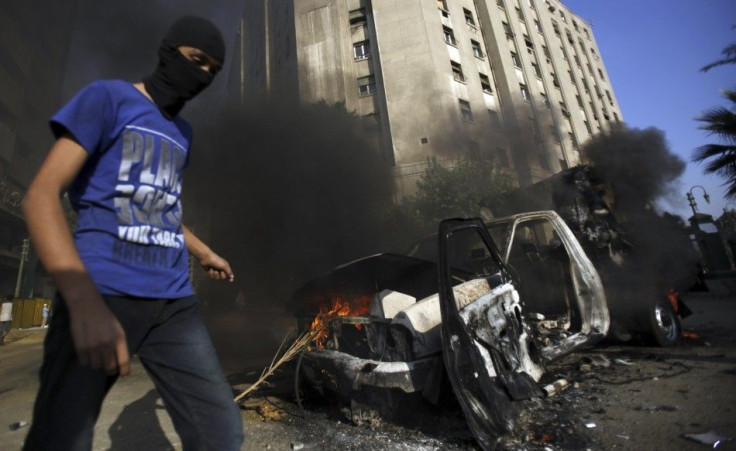Cindy Lee Garcia, Actress In Anti-Islam Film, Wants Name Cleared As Protestors Attack U.S. Embassy In Yemen

As details behind the making of "Innocence of Muslims," the amateur anti-Muslim movie that sparked violent protests in Egypt and Libya, began to slowly emerge on Wednesday, Cindy Lee Garcia, a California actress who was featured in the film, says she was duped and was unaware it was about the Prophet Muhammad.
Garcia, a California native who appears in clips of the film posted online, said she answered a casting call last year to appear in a movie titled "Desert Warrior," according to a Reuters report.
"It looks so unreal to me, it's like nothing that we even filmed was there. There was all this weird stuff there," Garcia told Reuters in a phone interview.
According to Reuters, Garcia said the film was shot in the summer of 2011 inside a church in Los Angeles, where actors stood in front of a "green screen," used to depict background images. About 50 actors were involved, she told the newswire.
An expired casting notice at Backstage.com, obtained by Reuters, listed a film named "Desert Warrior" that it described as a low-budget "historical Arabian Desert adventure film." None of the characters were identified in the casting call as Muhammad, Reuters reports.
"They told me it was based on what it was like 2,000 years ago at the time of the Lord," Garcia said. "Like the time Christ was here," Garcia told the news outlet.
Several media outlets have mentioned a man named Sam Bacile to be the films producer. According to reports, Bacile had previously identified himself to the media as an Israeli-American property developer. According to Reuters, he had told the media organizations that the film cost $5 million, some of which was paid by around 100 Jewish donors.
Reuters further reported that they could not independently confirm his responsibility for the film, or even that Bacile was his real name.
Steven Klein, a southern California man in the insurance business who described himself as a consultant and a spokesman for the project -- but not the filmmaker -- told Reuters in an exclusive interview that he believed the name was a pseudonym.
"I've met him twice, I don't know what country he's from. I do know he's not an Israeli Jew and I can only guess he threw that out to protect his family, which I do know is back in the Middle East," Klein said.
Outrage continues to break out after clips of the Muhammad film were posted on YouTube, which portrayed the Muslim prophet engaged in crude and offensive behavior. Many Muslims consider any depiction of the prophet as blasphemous.
While clips of the film had reportedly been on the video-sharing site for weeks, it was on late Tuesday night that they apparently triggered violent demonstrations outside the U.S. embassy in Cairo and consulate in Benghazi, Libya. The protests resulted in four dead U.S. diplomats, including U.S. Ambassador to Libya Christopher Stevens.
Protests continued on Wednesday and even into Thursday morning as hundreds of protesters angered by the anti-Islam film stormed the U.S. Embassy compound in Yemen's capital and burned the American flag.
As of now, American missions have been attacked in three Arab nations -- Yemen, Egypt and Libya. Officials are reportedly struggling to restore law and order, according to the Associated Press.
Violent protestors reportedly smashed windows as they trespassed on to the perimeter of the U.S. Embassy in Yemen and reached the compound grounds. While AP reported that they did not enter the facility, they did bring down the U.S. flag in the courtyard, burned it and replaced it with a black banner bearing Islam's declaration of faith -- "There is no God but Allah."
Reports indicate that Yemeni security forces who rushed to the scene fired in the air and used tear gas to disperse the demonstrators, driving them out of the compound after about 45 minutes and sealing off the surrounding streets.
It was not immediately clear whether anyone was inside the embassy at the time of the attack, AP reported.
The Yemeni Embassy in Washington condemned the attack and vowed to ensure the safety of foreign diplomats and to step up security measures around their missions in the country.
© Copyright IBTimes 2025. All rights reserved.






















